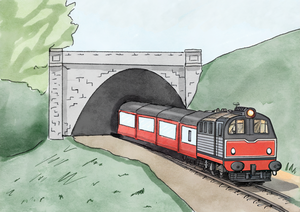
7.3 Continuous care is key to recovery
Rates of remission in people with substance use disorders vary depending on the type of substance.

7.3 Continuous care is key to recovery
Rates of remission in people with substance use disorders vary depending on the type of substance.
A U.S. study found REMISSION rates of 83.7% for tobacco, 90.6% for alcohol, 97.2% for cannabis, and an impressive 99.2% for cocaine.
However, RELAPSE remains a big concern. Alarmingly, about 50% of people recovering from tobacco use relapse within the 1st year. Within 3 years, approximately 20% of those who have recovered from cocaine use may relapse, while over 50% of individuals with alcohol use disorders do so.
While the risk of relapse decreases with sustained remission, it never entirely disappears. This emphasizes the need for ongoing support and intervention!
Early Support Matters
Early support plays an essential role in the successful recovery of individuals with schizophrenia and substance use.
Once a substance use disorder develops, it often becomes a chronic condition, leading to lasting changes in the brain.
These changes are compounded by various mental health and social challenges that individuals may face.
While abstaining from substance use can eventually help restore normal brain function, the degree of recovery differs depending on several factors, including:
• specific substance used,
• duration of the disorder,
• level of support received during recovery.
Most individuals with SUDs experience cycles of remission and relapse, reinforcing the need for early intervention and longterm consistent support.
Recognizing early signs of substance use
Early intervention is key, particularly given the strong link between early substance use and the risk of developing SUDs.
Recognizing signs of use, such as sudden changes in behavior or mood can open the door to important conversations.
Engaging in a compassionate, nonjudgmental dialogue about these concerns can create a supportive environment for individuals to share their experiences and challenges.
Helping loved ones before addiction takes hold: understanding pre-addiction
Substance misuse is far more common than full-blown addiction, yet even moderate use can be a warning sign. If ignored, substance use can transition to substance use disorder (SUD) and lead to more severe consequences.
To address this early stage of substance use, experts have introduced the concept of “pre-addiction”, a term inspired by “pre-diabetes.”
The term “pre-addiction” refers to the early stages of substance use that haven’t yet developed into a severe addiction. Much like “pre-diabetes,” this concept encourages early recognition and intervention to prevent further progression to severe SUDs.
For caregivers, understanding “preaddiction” means recognizing that even mild or moderate substance use can be a sign of vulnerability.
By acting early – through support, open communication, and connection to resources – healthcare providers and caregivers can potentially prevent many negative outcomes associated with unhealthy substance use and stop the transition to substance use disorders. This approach helps both individuals and caregivers to prevent long-term harm and support a healthier, more stable future.
How caregivers can help early detection of SUD

Encourage open conversations.
Create a safe space where your loved one feels comfortable discussing substance use. A simple question or expression of concern can spark meaningful dialogue.

Know the screening tools.
Familiarize yourself with common screening methods and criteria. Understanding what healthcare providers assess can help you spot early signs of problematic use.

Advocate for screening.
If you suspect substance use, encourage your loved one to discuss it with their doctor. Suggest that they ask specific questions about their substance use during appointments.

Observe behavioral changes.
Watch for shifts in mood, health, or daily habits that could signal substance misuse. If you notice concerning signs, it may be a good time to initiate a conversation about seeking help.

Encourage professional support.
If screening reveals a problem, help your loved one find resources or treatment. Your guidance and support can increase their willingness to seek help.

Use informal screening at home.
While formal screenings are essential, you can also ask informal questions to recognize substance use. Simple, nonjudgmental questions about drinking habits or medication use can be a starting point for deeper conversations.
Screening tools to assess substance use habits
One of the most significant opportunities in healthcare today is the early detection of substance use disorders (SUDs).
By being proactive and engaged, caregivers can significantly contribute to the early identification of substance use issues.
Tools like the Alcohol, Smoking, and Substance Involvement Screening Test (ASSIST) and the Tobacco, Alcohol, Prescription Medication, and Other Substance (TAPS) are designed to quickly assess substance use habits.
For example, ASSIST includes simple questions that can help determine whether someone’s alcohol or drug use is hazardous or harmful.
These screenings can happen during routine medical appointments, providing an excellent opportunity to catch issues early.
“Chronic Care Model” for long-term care
Achieving the best outcomes for individuals with substance use disorders (SUDs) requires long-term care.
One effective approach is the Chronic Care Model, originally designed for diabetes, is now effectively used for SUDs, emphasizing continuous care, which leads to better management of the disorder over time.
For instance, a person who has recently relapsed may need frequent check-ins or medication adjustments, whereas someone in sustained recovery may require less intensive care. Lifestyle changes – such as reducing substance use and joining support groups – can significantly increase long-term recovery success.
The Chronic Care Model integrates SUD treatment into regular medical care, increasing accessibility and lowering costs. It tailors care to individual needs – some may only need community resources or primary care support, while others benefit from specialized outpatient or inpatient programs.
This ensures personalized care without overwhelming healthcare systems.
Supporting a loved one’s journey: tips for caregivers

A stable daily routine can provide security and may help reduce substance use over time.

Gently reminding your loved one about their treatment plan, including prescribed medications, can be helpful. If they’re struggling to keep up, discussing challenges in a caring, open way may lead to solutions.

Keeping communication open encourages honesty. A judgment-free space makes it easier for them to share their struggles with substance use and other challenges.

Watching for mood or behavior changes allows you to address potential relapse early.

Encouraging stress management through mindfulness, exercise, or enjoyable hobbies can support their well-being.

Connecting with mental health professionals experienced in schizophrenia and substance use disorders can provide specialized guidance and resources.

Supporting participation in recovery programs, such as 12-step groups, can offer connection and encouragement, which can be reassuring during difficult times.

Recovery involves progress and setbacks. Offering your emotional support along the way and celebrating even small victories can be deeply motivating.

Prioritize your own well-being. Caregiving is demanding, so practicing self-care and seeking support ensures you remain resilient.
With compassion and patience, you can provide meaningful support, helping your loved one facing schizophrenia and substance use challenges toward recovery.